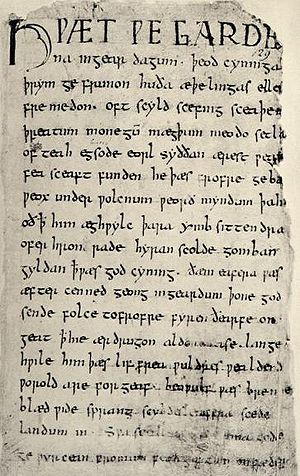- Dorothy Whitelock
-
Dorothy Whitelock (November 11, 1901 – August 14, 1982) was an English historian. Her best-known work is English Historical Documents, vol. I: c. 500-1042, which she edited. It is a compilation of translated sources, with introductions.
Her other works include The Beginnings of English Society (1952), After Bede (1960), The Audience of Beowulf (1951), and Genuine Asser (1967), in which she argued against V.H. Galbraith's assertion that Asser's Life of King Alfred was a forgery by Leofric.
Contents
Career
Born in Leeds at the beginning of the twentieth century, Whitelock was a promising student at school and it came as no surprise when she went up to Newnham College, Cambridge at the age of 20, where she studied under Hector Munro Chadwick.
In 1930 she published a translation and commentary on thirty nine Anglo-Saxon wills.[1]
Throughout her career, Whitelock found herself frustrated by a male-dominated academy which often favoured male scholars at the expense of talented female academics. In 1945, following her failure to secure a professorship at the University of Liverpool, Whitelock applied for the Rawlinson and Bosworth professorship of Anglo-Saxon at the University of Oxford, a chair that had been vacated by J. R. R. Tolkien. Again, she was unsuccessful (Tolkien himself had voted against her). Whitelock was tempted, in the face of such opposition, to abandon the academy altogether. However, the famous Anglo-Saxon historian Sir Frank Stenton and his wife, with whom Whitelock was close friends, addressed a series of supportive letters to her, encouraging her to persevere.
During the 1950s, Whitelock returned to her work with renewed vigour, producing a series of important works culminating, in 1955, with her most famous book, English Historical Documents. Her achievements were finally recognised in 1956, when she was elected a fellow of the British Academy. In 1957, Whitelock returned to Cambridge, where she had begun her career, succeeding Bruce Dickens as Elrington and Bosworth Professor of Anglo-Saxon (in which capacity she supervised Simon Keynes, the post's present incumbent). Under her direction, the 'Department of Anglo-Saxon and Kindred Studies' relocated from the Faculty of Archaeology and Anthropology to the Faculty of English and became the department of Anglo-Saxon, Norse and Celtic, as it remains to this day. A photograph of her hangs on the wall there.
Influence
Dorothy Whitelock's impact upon Anglo-Saxon studies cannot be overestimated. Though some of her work has subsequently been questioned[citation needed], and some now feels dated in the light of more recent scholarship[citation needed], the majority of her scholarship remains a gold standard in the field.
External links
- Biography at the Oxford Dictionary of National Biography
- Portrait of Dorothy Whitelock at the National Portrait Gallery
References
Categories:- English historians
- 1901 births
- 1982 deaths
- Alumni of Newnham College, Cambridge
- Fellows of St Hilda's College, Oxford
- Anglo-Saxon studies scholars
Wikimedia Foundation. 2010.

